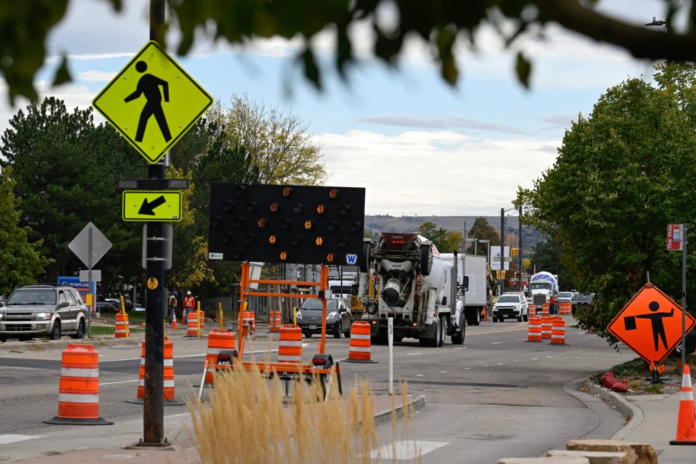Is the third time a charm for a transportation management fee in Boulder?
The Boulder City Council is considering the fee to keep up with maintenance of roads, bridges and other infrastructure needs. The first reading was approved by the city council in its Thursday meeting on a 6-1 vote. Mark Wallach voted against is while Taishya Adams and Tara Winer absent. This is the third time the fee has been considered by the city council since a 2008 report concluded the city needed to raise revenue and diversify its revenue sources.
A study presented to the city council on Thursday estimates the fee could raise about $6.2 million in the first full year of collection for unfunded or underfunded transportation capital maintenance projects, and $6.4 million total. In 10 years, the city estimates the fee could generate more than $6.8 million. The fees apply to various private property ownership types to account for the number of trips to the property. The city has about $6.4 million in underfunded or unfunded transportation-related maintenance, the study says. That includes about $4.2 million in pavement and street safety asset management. City staffers say kicking the can down the road will only lead to higher costs.
As presented, single-family detached residents — think of a standard house — would pay around $54 per year. Multi-family attached residences, such as an apartment, would pay $42 per year. Mobile homes would be exempted from the fee.
For non-residential property owners, the fee ranges from $11 (owner of a warehouse facility) to $160 (owner of a retail property) annually per 1,000 square feet. A non-public university is subject to $7 per student. For non-public primary schools, an elementary school would be subject to $10 per student, a middle school would be subject to $9 per student and a high school would be subject to $8 per student.
The Boulder Valley School District and the University of Colorado – Boulder are not subject to this fee, but it’s possible for the city and those institutions to sign an agreement to contribute to the fund. Chris Hagelin, the principal planner at the city who presented the fee to the council, said Thursday that those conversations have not begun.
The fee would apply to people living in affordable housing, which sparked Wallach’s “no” vote and hesitation from councilmember Matt Benjamin. The memo says rebates are possible for low-income households.
In a Sunday message to the council’s email hotline, Wallach estimated that exempting residents of the approximately 2,000 units operated by Boulder Housing Partners would take out about $84,000 from the fee’s projected revenue.
“If the total deduction is more than we would care to bear, perhaps we can consider a reduced payment/unit, rather than a full deduction, as we do for several other categories against which we assess the TMF,” Wallach wrote.
Benjamin also had concerns about snow and ice response not being included in the study. City staffers said the purpose of the fee is to address capital maintenance, not operations.
There are lingering concerns from the business community, as well.
In 2008, a commission recommended a similar fee for the city, but that was never adopted. A transportation management fee was again recommended in 2019, but the COVID-19 pandemic ultimately threw it off. Much has changed since then for the business community, Boulder Chamber of Commerce CEO John Tayer said, and a fee may be too burdensome. This fee also comes at a time when the city is seeing a slowing growth in sales and use tax revenue.
Tayer acknowledged the need for transportation maintenance that the city has a need for maintenance projects, but hopes it finds a way to allocate other money in the budget to the projects.


